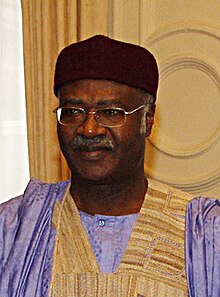Not to be confused with Secretary-General of the United Nations. Chair and presiding officer of the General Assembly
| President of the United Nations General Assembly | |
|---|---|
 Emblem of the United Nations Emblem of the United Nations | |
 Flag of the United Nations Flag of the United Nations | |
 Incumbent IncumbentPhilemon Yang since 10 September 2024 | |
| United Nations General Assembly | |
| Style | His Excellency |
| Status | Presiding officer |
| Member of | General Assembly |
| Residence | New York City ( International Territory) |
| Seat | United Nations Headquarters |
| Appointer | Member states of General Assembly |
| Term length | One year |
| Constituting instrument | Charter of the United Nations |
| Inaugural holder | Paul-Henri Spaak |
| Formation | 1946 |
| Website | un.org/en/ga/ |
The president of the United Nations General Assembly is a position voted by representatives in the United Nations General Assembly (UNGA) on a yearly basis. The president is the chair and presiding officer of the General Assembly.
Election

The session of the assembly is scheduled for every year starting in September—any special, or emergency special, assemblies over the next year will be headed by the president of the UNGA.
The presidency rotates annually between the five geographic groups: African, Asia-Pacific, Eastern European, Latin American and Caribbean, and Western European and other States.
Because of their powerful stature globally, some of the largest, most powerful countries have never held the presidency, including the five permanent members of the United Nations Security Council and Japan.
A few countries had a national elected as president of UNGA twice: Argentina, Chile, Ecuador, Hungary and Nigeria; all the other member states had a national holding this office once (not counting additional special and emergency special sessions of UNGA and also not considering that the then separate West Germany and East Germany held the presidency once each during the Cold War). In addition to the president, a slate of 21 vice-presidents are elected for each General Assembly session. The vice-presidents have the same powers and duties as the president, and the president may designate one of them to cover his absence from any meeting or part thereof.
List of presidents
Abbreviations
- Pre-1966
- COS: Commonwealth Seat
- EAS: Eastern European and Asian Seat
- LAS: Latin American Seat
- MES: Middle Eastern Seat
- WES: Western European Seat
- Since 1966
- Africa: African Group
- Asia-Pacific: Asian Group, since 2011 the Asia-Pacific Group
- EEG: Eastern European Group
- GRULAC: Latin American and Caribbean Group
- WEOG: Western European and Others Group
See also
- President of the United Nations Security Council
- President of the United Nations Economic and Social Council
References
- "About the General Assembly". United Nations. Retrieved 7 March 2022.
- "Who are the Vice-Presidents of the General Assembly?". Dag Hammarskjöld Library. United Nations. Retrieved 1 April 2024.
- "UNGA: Rules of procedure". United Nations. Retrieved 1 April 2024.
- "Past Presidents". General Assembly of the United Nations. Retrieved 7 March 2022.
- "Nassir Abdulaziz Al-Nasser of Qatar Elected President of General Assembly's Sixty-Sixth Session; Vice-Presidents, Main Committee Chairs Also Named". United Nations. 22 June 2011. Retrieved 7 March 2022.
- "Asian Group of Nations at UN Changes Its Name to Asia-Pacific Group". Radio New Zealand. 1 September 2011. Retrieved 7 March 2022.
External links
- UN: List of UN General Assembly presidents
- UN General Assembly President Election Reform.
- UNelections.org.
- Elections and appointments (2020-2021)
| Presidents of the United Nations General Assembly | |
|---|---|
| 1940s | |
| 1950s | |
| 1960s | |
| 1970s |
|
| 1980s | |
| 1990s | |
| 2000s | |
| 2010s | |
| 2020s | |
| Permanent representatives to the United Nations | |
|---|---|
| Africa | |
| Americas | |
| Asia | |
| Europe | |
| Oceania | |
| Permanent observers | |
| Related articles | |





































































